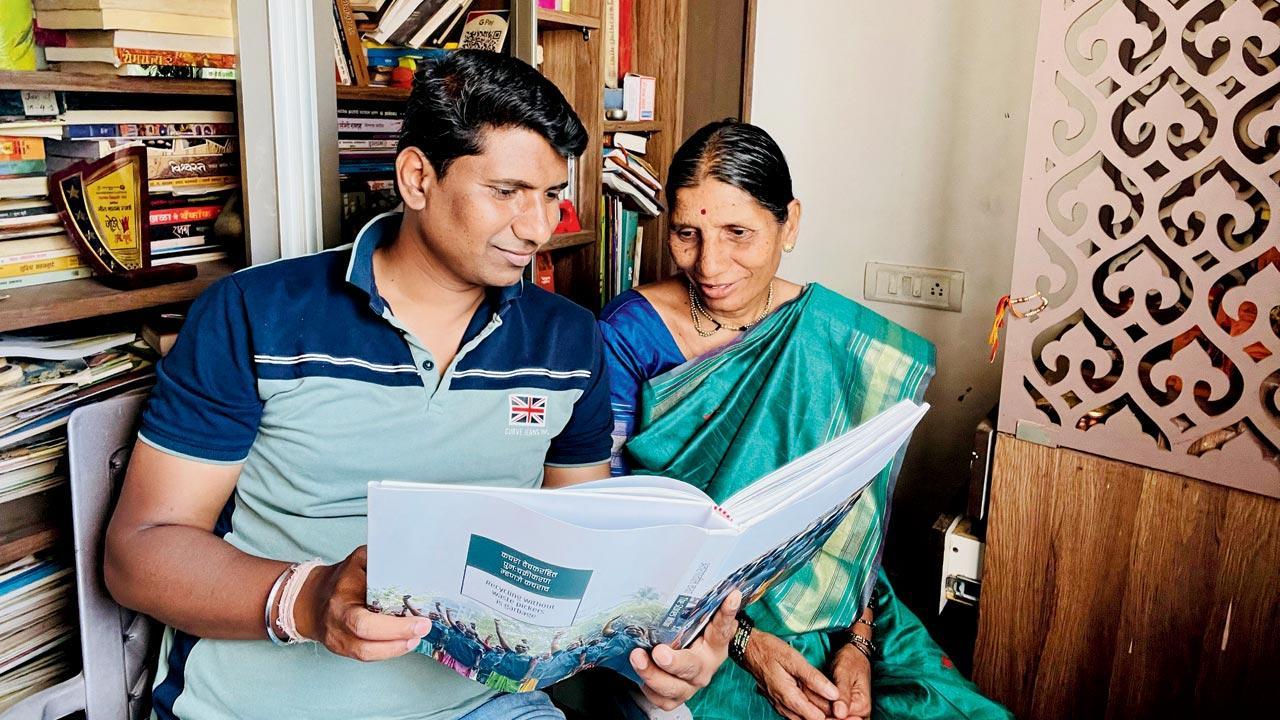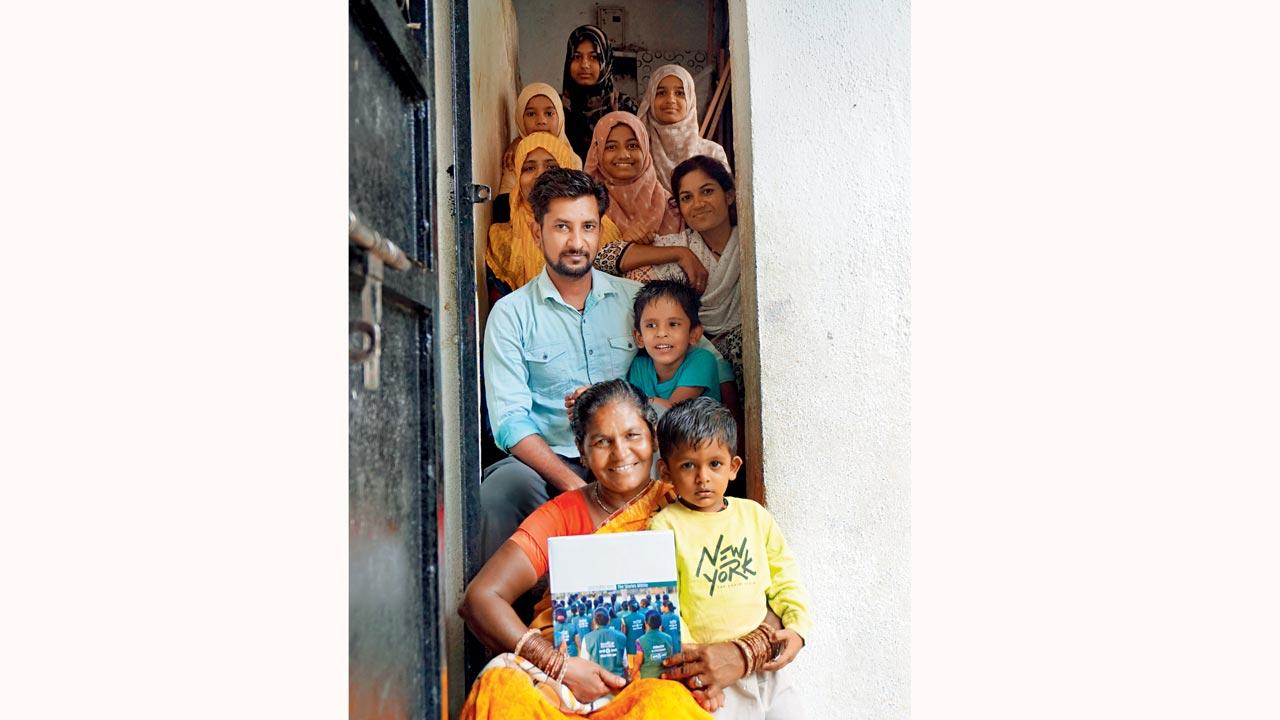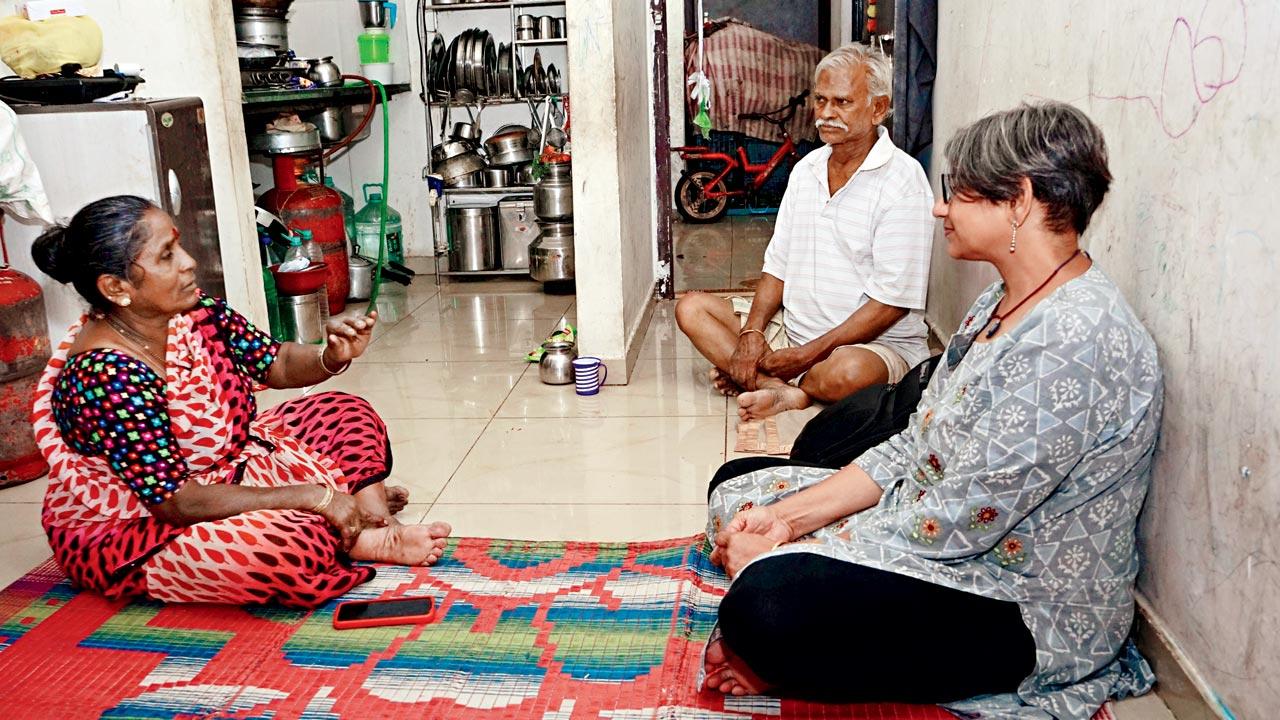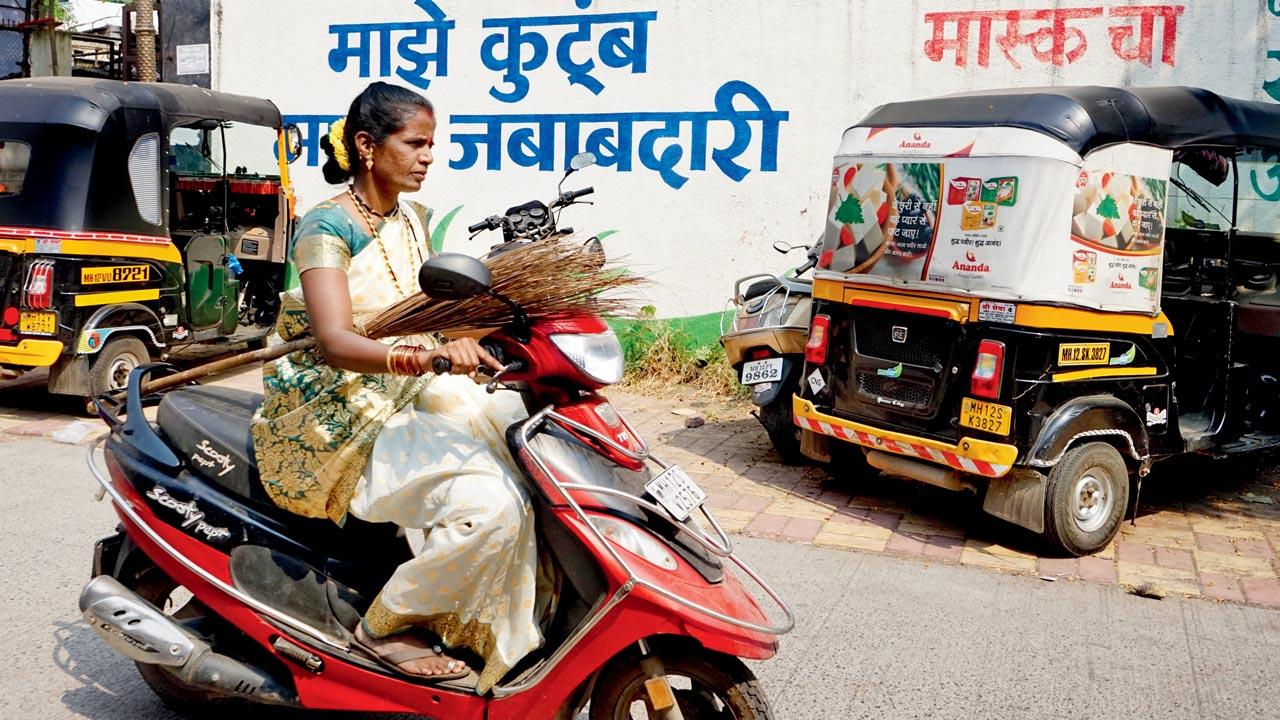How does it feel to be perceived on par with scavenging rodents and dogs? Such uncomfortable questions, posed to waste pickers by eminent interviewers, now are part of a groundbreaking volume which is also a badge of honour for the recycling community

Suman More and her journalist-son Laxman read about her three-decade struggle as a waste picker in the book Antarangatil Katha (The Stories Within)
![]() Who built seven-gated Thebes? Was it kings who hauled the chunks of rock? Famed writer Bertolt Brecht’s poem, Questions From A Worker Who Reads challenged traditional narratives that celebrate kings and generals while overlooking the achievements of the common people. Nearly a century after Brecht’s call for recognition of toiling hands, Pune’s waste pickers pose a similar question. A new 240-page Marathi-English hardbound title, Antarangatil Katha (The Stories Within) echoes Brecht’s critique of working-class marginalisation. In Brechtian style, the waste pickers ask, “The Mohalla Committee segregated waste in 156 wards/Did the members dunk their hands into the bins?/Or did they ring the doorbell to collect the garbage/Armed with police verifications?”
Who built seven-gated Thebes? Was it kings who hauled the chunks of rock? Famed writer Bertolt Brecht’s poem, Questions From A Worker Who Reads challenged traditional narratives that celebrate kings and generals while overlooking the achievements of the common people. Nearly a century after Brecht’s call for recognition of toiling hands, Pune’s waste pickers pose a similar question. A new 240-page Marathi-English hardbound title, Antarangatil Katha (The Stories Within) echoes Brecht’s critique of working-class marginalisation. In Brechtian style, the waste pickers ask, “The Mohalla Committee segregated waste in 156 wards/Did the members dunk their hands into the bins?/Or did they ring the doorbell to collect the garbage/Armed with police verifications?”
ADVERTISEMENT
The poem prefacing the testimonies of 20 waste pickers from Pune, underlines a global truth about those who reclaim the discards of our society. Can we recycle waste without factoring in the welfare and rights of those who dirty their hands? Does society owe a duty towards the impoverished who find refuge in refuse—the men and women who source recyclables from streets, homes and landfills? Do we owe them safety gear, medical support, fair compensation, guaranteed wages, and respect? Do their children deserve social security?
 After Apsara Shaikh left her husband, she was inducted into the world of scrap dealers; it opened the gates of opportunities and saved her from a life of a domestic servant
After Apsara Shaikh left her husband, she was inducted into the world of scrap dealers; it opened the gates of opportunities and saved her from a life of a domestic servant
The poem that raises uncomfortable questions is written by Poornima Chikarmane, who has long worked with Pune’s waste picker community. Chikarmane and Lakshmi Narayanan, who have conceptualised Antarangatil Katha, are also co-founders of SWaCH, the women-led workers’ cooperative and a pro-poor Public Private Partnership that undertakes waste management in Pune. The pair is also involved in Kagad Kach Patra Kashtakari Panchayat, a membership-based trade union that works for the cause of waste pickers and itinerant waste buyers in Pune and Pimpri Chinchwad.
Chikarmane’s introductory chapter titled Recycling Without Waste Pickers Is Garbage sets the in-your-face yet lyrical tone for the bilingual collectors’ book. She presents a global overview of cleaners, chiffoniers, ragpickers in cities as varied as New York, Paris, Cairo, Payatas, Johannesburg, Bogota, Mumbai and, of course, Pune. Recalling the series of unfortunate accidents around garbage mounds and toxic fumes rising from landfill fires, she puts the spotlight on the seemingly invisible community in each city that lives beyond the pale, which “often carries the weight of discrimination and criminalisation, along with the sacks of recyclables on its back.”
 Chai Pe Charcha: Interviewer Sanskriti Menon (right) with Saru and Shyam Waghmare
Chai Pe Charcha: Interviewer Sanskriti Menon (right) with Saru and Shyam Waghmare
The Stories Within redefines the conventions of coffee table literature in many ways, thereby transforming the large decorative volume into a serious read. What traditionally would be placed on a centre table for casual perusal with a drink or coffee daringly features waste pickers and their universe on the cover.
Each waste picker face stands out as an open ledger in life’s balance sheet. Wrinkled foreheads, weathered hands, unadorned feet, and the absence
of makeup adds a unique sparkle to the women’s smiles. The book becomes a bouquet of gorgeous women who were born in less than ideal circumstances, but
have managed to draw meaning amidst life’s inequities.
 Armed with brooms, waste picker Vaishali Kasbe rides ahead. Pics Courtesy/Vidyasagar Sonawane for Swach Cooperative, Pune
Armed with brooms, waste picker Vaishali Kasbe rides ahead. Pics Courtesy/Vidyasagar Sonawane for Swach Cooperative, Pune
Lakshmi Narayanan is particularly proud of the multiple stakeholders who contribute to the visual-intellectual appeal of the volume. The SWaCH team was clear that it did not want to add another glossy book to the discourse, because the book will further add to paper waste, which will be a travesty of the core values of the organisation. SWaCH aimed for a long shelf life for their book. “We were keen on stories that are readable, varied, representative of a cross section of waste pickers—young, old, local, migrant, working for few/several years, male-female, etc. That we didn’t manage to get a male voice is another story, but our book was sculpted through the lens of different citizens who bring different perspectives,” says Narayanan, who believes that a joint ownership of the book adds to its inclusive appeal. The writers who interview the 20 waste pickers, are a heterogenous mix. Each story is narrated in unique unhurried style; of course, some pieces are better-written and edited than some others that ramble.
The lead photographer Vidya Kulkarni also pens one waste picker portrait; writer-lawyer Sandhya Gokhale is involved in design and layout and doubles up as her own translator; writer-child rights activist Mini Srinivasan renders 11 Marathi testimonies into English; Narayanan says the book holds “personal value” for varied professionals, including three elected representatives. Former Rajya Sabha MP Vandana Chavan introduces Vidya Anna Naiknavare who serves over 250 households daily; Deputy Chairperson of Maharashtra Legislative Council Dr Neemal Gorhe, interviews the self-made SWaCH activist Sarika Gaikwad, who is a single mother too. Former municipal councillor Madhuri Sahasrabuddhe gets talking with Mangal Shingare, a waste picker for 25 years.
The first 2,500 copies printed by SWaCH have landed on the coffee tables of public policy officials, governance visionaries, Delhi politerati, Pune academia, in NGO offices, among environment worriers and women’s movement allies. The 20 women waste pickers featured in the book have been gifted five copies each, so as to engage the wider community which we are told are earnestly enjoying the book.
Kamal Shinde’s copy travelled to the US. Her long-time admirers, at whose doorstep she collected waste over the years, wanted to show the book to their daughter who lives outside India. For Mangal Gaikwad, the book brought respect in the vicinity, especially from neighbours who never nodded in recognition. Sarika Karhadkar took the book along with her to the Elective Congress of the International Alliance of Waste Pickers at Buenos Aires, Argentina. It gave her an opportunity to bond with fellow waste pickers from 32 countries. For many, the book earned an “I’m proud of you, aai” compliment. Apsara Shaikh was in tears when her son and granddaughters read the book collectively to every house guest.
The interviewer—an ostensibly external observer—bares the caste-class dynamic in the business of waste collection. For instance, Suman More’s three-decade old struggle as a waste picker is brought alive by Pratima Pardeshi, the editor of Satyashodhak Jagar. Pardeshi travels in time to trace the migrations witnessed by the unschooled Suman born in a Matang family in Beed. When she was married into a Mang caste family as a child, she migrated to Osmanabad; in 1972, she migrated from Marathwada to Pune with her potraj (self-flagellating folk artiste) husband and children. With no resources in Pune, the couple took to picking waste in Gultekdi. Hunger was a familiar companion, mostly when children went to school without lunch boxes. The children could be given tea and biscuits only after aai did the “morning collection” and sold the waste for whatever it was worth. The daily labour continued for years, as if life was about gathering, segregating and selling cardboard, broken beer bottles and tin. Misery came in another form when the Pune Municipal Corporation started doorstep collection, thereby removing the community garbage bins. Then came the collection of waste from housing societies, due to which many waste pickers were charged with thievery. However, for the likes of Suman tai, SWaCH protected the livelihoods of the collectors, compelled the municipality to give hand carts/buckets, and devoted collectors for hospital waste. As Pardeshi puts it aptly: Suman tai treated waste collection as a rightful source of income; she found power in the slogan, kachra aamchya hakkacha, nahi kunachya bapacha!
As Suman tai’s journalist-son Laxman More adds, “I have seen the book in the making when Pratima tai did four major sittings with aai in our house. I could sense the world will soon know my mother’s struggle against varied forces, policemen included. Also, the sisterhood gifted by the union is evident in her story.” Suman tai and others call SWaCH their maaher (maternal home); a safe cocoon where they can cry, laugh, unwind, share, care, and most importantly dream together of a better tomorrow.
Like Pardeshi, Joseph Lobo, a former philosophy professor at Fergusson College, strikes an insightful conversation with Mangal Gaikwad on what it means to claim the identity of a waste picker in an Indian metro. How does it feel to be perceived on par with scavenging rodents and dogs? Has the perspective changed over the years?
Eminent endocrinologist Dr Uday Phadke’s exchange with 60-year old Kamlabai Shinde is eye-opening. She collects animal and human bones, as it pays more than other scrap. A single mother who lives below the poverty line and has dependent children to look after doesn’t cut a sorry figure; on the contrary, Dr Phadke finds an immense life force in the woman. He says Kamlabai is among the gutsy pioneering waste management experts who taught Punekars to separate dry and wet waste at source.
Women’s activist Sadhana Dhadich, currently working for a tribal education project in Palghar district, effectively charts Apsara Shaikh’s trajectory. Shaikh left her husband in Solapur in 2000. As she landed in Pune, begging was the only option if she was to feed her hungry children. But her slow induction into the world of scrap dealers opened the gates of opportunities; it saved her from a life of a domestic servant. After having dealt with scrap of different varieties—metal, glass, rubber, paper, textiles and e-waste—she now has a fair understanding of the market of reuse/recyclable material. Her entry into KKPKP and SWaCH empowered her with best practices around waste separation; during the COVID-19 crisis, the union provided gloves, masks and soap to all waste pickers.
Today, she and her daughter earn a monthly sum around Rs 50,000, except in the monsoons when the paper waste goes down. But struggles haven’t abandoned her, she confides in Dhadich. The 3 am chore of waste collection and the quick vada pav for lunch is still a ritual. But she now enjoys a sense of pride in waste gathering; there is no shame associated with her work. She calls herself an entrepreneur; she is a board member of KKPKP; she suggests innovative ways to repurpose the discards; of late, she earned good money by collecting human hair from the garbage, which she had sold to makers of wigs.
The Stories Within transports you to the society’s edge, reminding you that the lives of waste pickers are not disposable.
Sumedha Raikar-Mhatre is a culture columnist in search of the sub-text. You can reach her at [email protected]
 Subscribe today by clicking the link and stay updated with the latest news!" Click here!
Subscribe today by clicking the link and stay updated with the latest news!" Click here!







